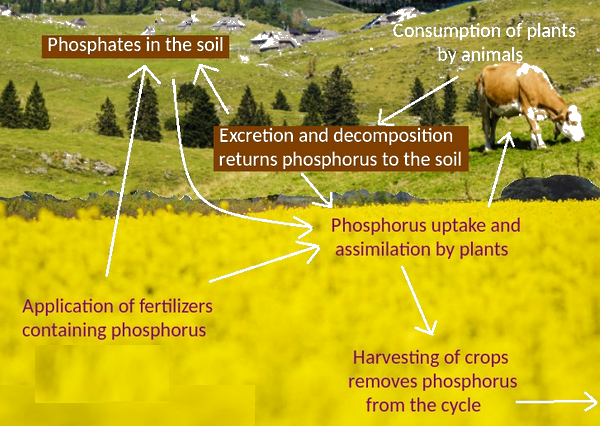Phosphorus cycle
 Phosphorus is an important element in cells, it is vital for the formation of plasma membrane, DNA and ATP. In agriculture, phosphorus is added to the soil using fertilizer, to increase agricultural production. This activity is covers the understandings of the phosphorus cycle. There is a short introductory exercise followed by an in-depth research activity and a tricky Ib style 'Discuss' question.
Phosphorus is an important element in cells, it is vital for the formation of plasma membrane, DNA and ATP. In agriculture, phosphorus is added to the soil using fertilizer, to increase agricultural production. This activity is covers the understandings of the phosphorus cycle. There is a short introductory exercise followed by an in-depth research activity and a tricky Ib style 'Discuss' question.Lesson Description
Guiding Question
Phosphorus is required to make all the molecules shown in the diagram. Can you identify each of the molecules?

Activity 1 - Introduction to the phorphorus cycle
Look at the infographic below about the Phosphorus cycle. Then answer the questions below.

Answer the following questions
Questions
- Which processes add phosphorus to the soil?
............................................................................... ......................................................................................... - Describe two methods by which phosporus leaves the soil.
............................................................................... ......................................................................................... - How do plants take phosphorus from the soil?
............................................................................... ......................................................................................... - Name three molecules in living cells which require phosphorus?
............................................................................... ......................................................................................... - Where do we get phosphorus from to make fertilizer
............................................................................... .........................................................................................
Activity 2 - A Global Phosphorus crisis
Man-made phosphorus pollution is reaching dangerously high levels in freshwater basins around the world. The ever increasing use of phosphate is also causing some to predict a global food crisis in the near future. What are the issues, and are there solutions?
Use the ![]() Phosphorus issues and solutions worksheet shown below to familiarise yourselvesd with the problem.
Phosphorus issues and solutions worksheet shown below to familiarise yourselvesd with the problem.
Activity 3 - A Canadian professor explains
Watch this short presentation (14 minutes) about the potential crisis in agriculture caused by problems in the supply of phosphorus for the manufacture of fertilizers and an ingenious natural solution using Mychorrizae. A fungus which is known to grow in symbiosis with plant roots and which greatly increases a plants uptake of phosphates from the soil.
![]() Phosphate the unknown crisis in agriculture
Phosphate the unknown crisis in agriculture
After watching this video record your ideas about the problems of phosphate in agriculture using the following format.
- First list three things you think you know about this topic?
......................................................................................
......................................................................................
......................................................................................
- Then add two or three questions which you still you have?
......................................................................................
......................................................................................
Teacher's notes
This lesson explores some of the issues which surround the phosphorus cycle.
At a first glance the idea seems simple but understanding the issues requires a clear knowledge of the molecules which contain phosphorus in the cells of living organisms, and a good grasp of chemistry as well as an understanding of some basic geology. It is an opportunity to link together ideas from the Ecology topic and the option, and conparisons could be made to the Nitrogen cycle or the Carbon cycle, both of which have a gaseous component which disperses in the atmosphere. This is ani interesting point alone.
Activity 1 is a simple introduction the the basic ideas about where phosphorus is found and how it moves from place to place. This could be a class actvity or an individual note making preparation activity for the lesson.
Activity 2 is a more detailed look at some of the concepts and some of the problems which humans have created. It is a guided research activity, with a "Discuss" question to conclude the processes.
An interesting way to run activity two might be to get students into groups of six and ask each student to become an expert in just one of the articles. They could read the short article and then do some research, and perhaps even a short presentation.
Activity 3 is designed as an extension activity which would take the faster students a little further. This TED talk describes one of the most promising solutions which exist to solve both pollution and eutrophication from human activities with phosphates, and the potential global shortage of phosphorus from mining in 2070.
Then groups of six could decide on a mark scheme for a student answer to this question.
Of course teachers are free to use the resources in whichever way best suites their students, the pressure on time and the school situation. If you are teaching in Florida or West Sahara a visit to a phosphorus mine could be real eye opener.
Further information can be found here: https://theconversation.com/fr/topics/phosphorus-1878
These articles are written by academics and are very accessible reading.

 IB Docs (2) Team
IB Docs (2) Team
